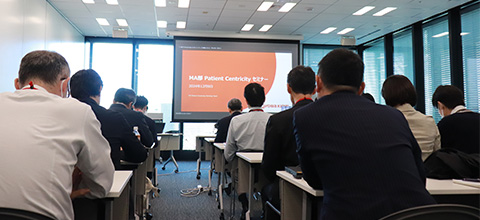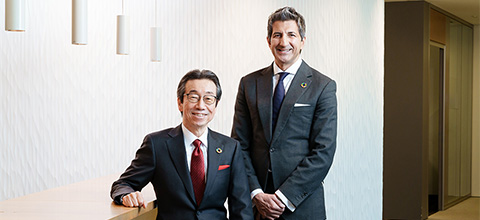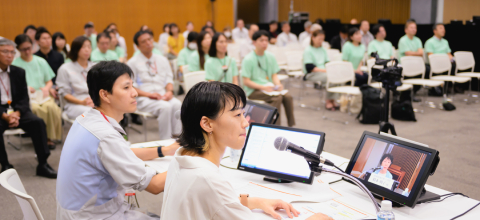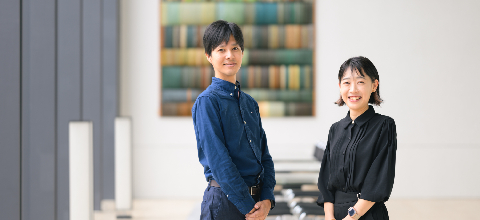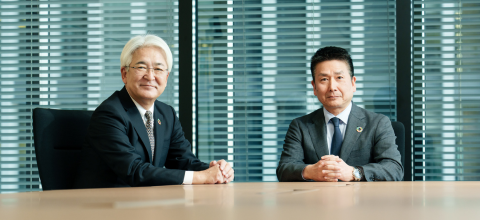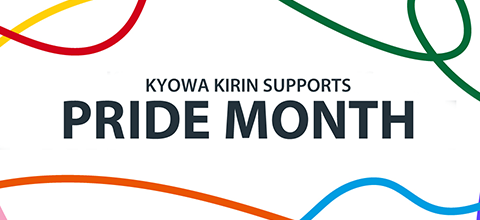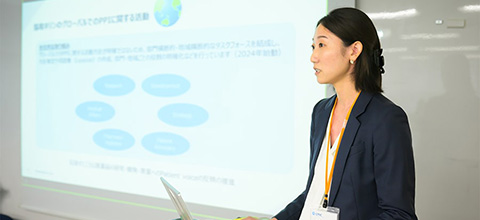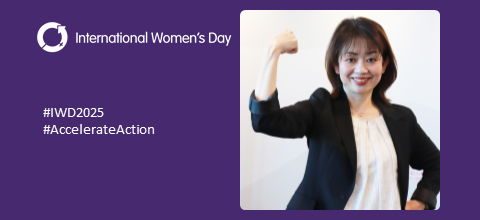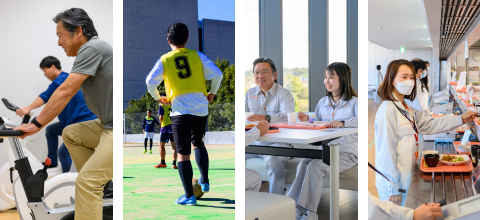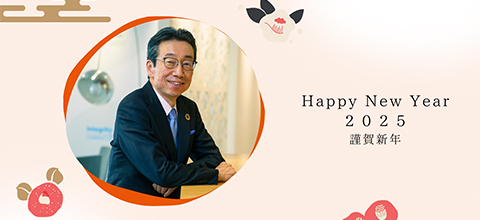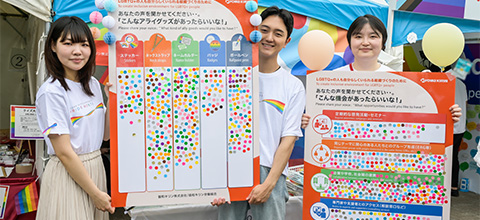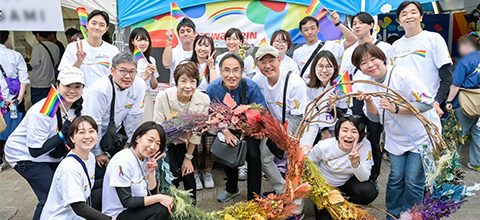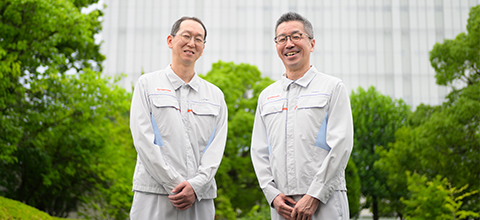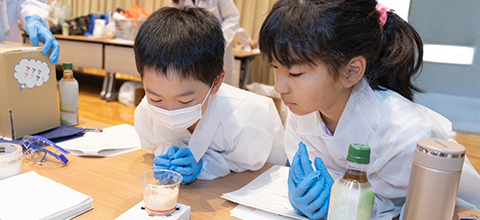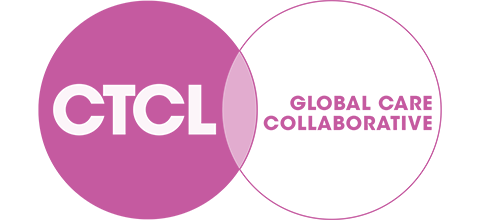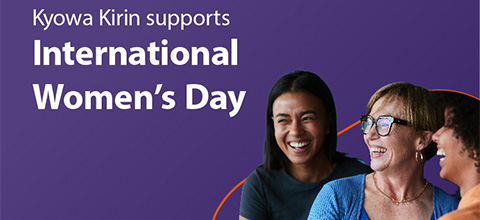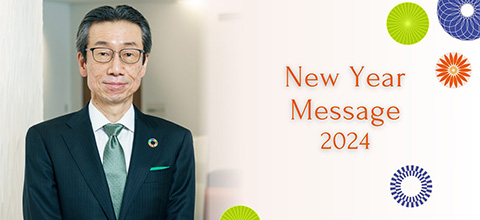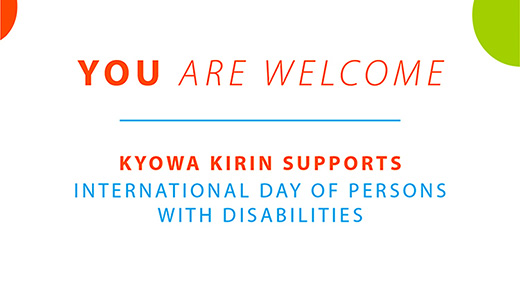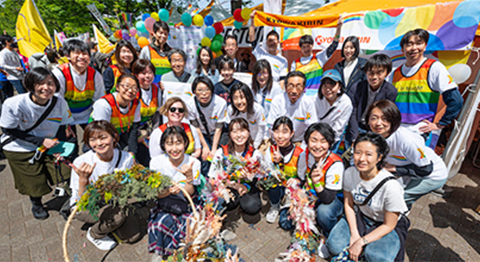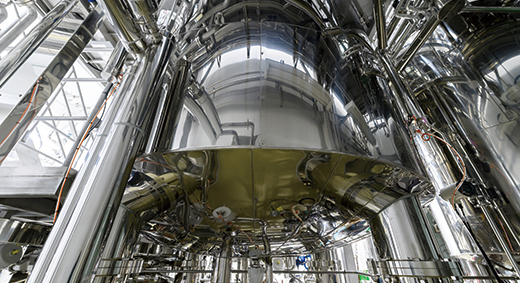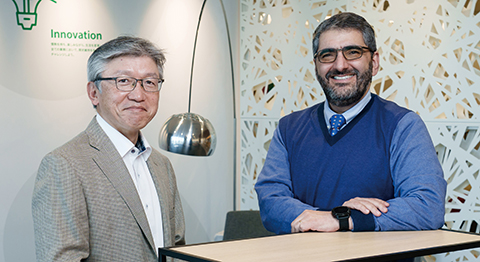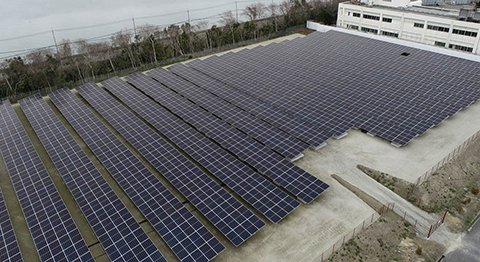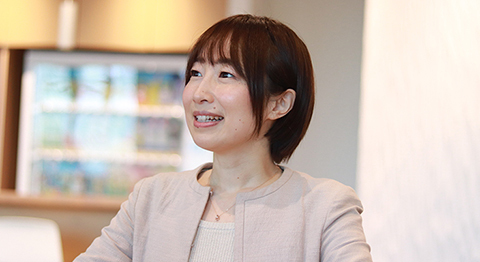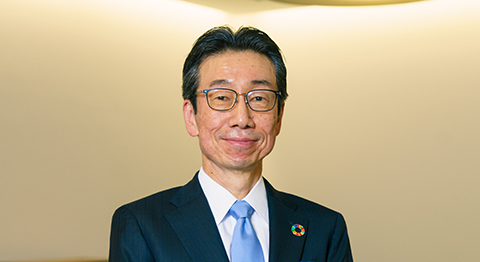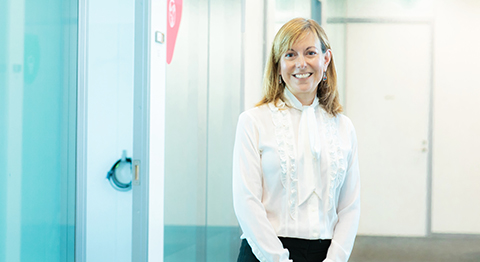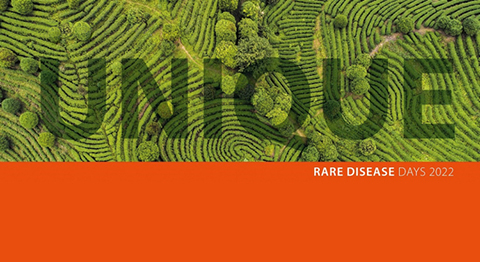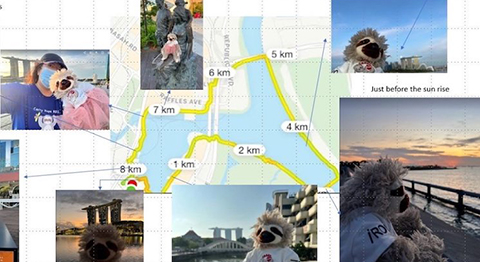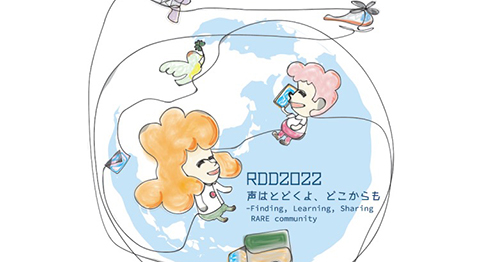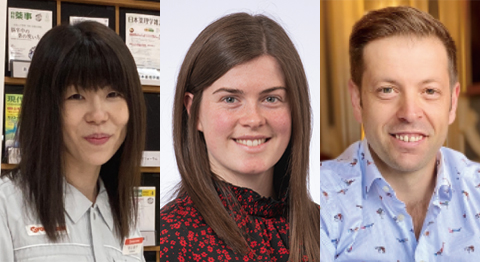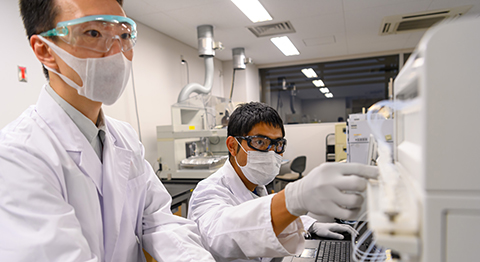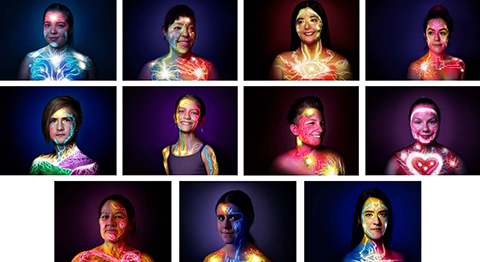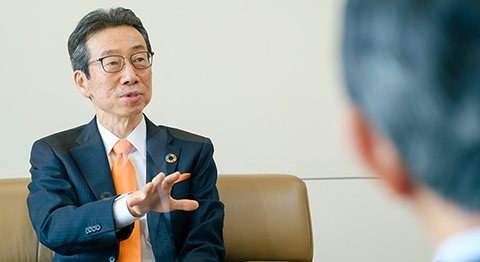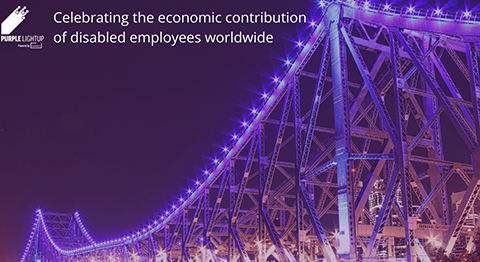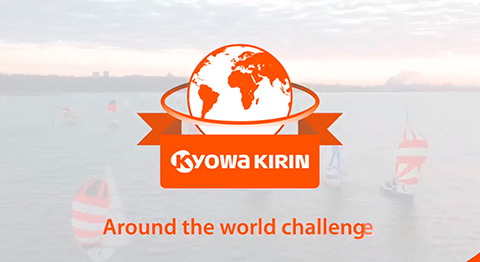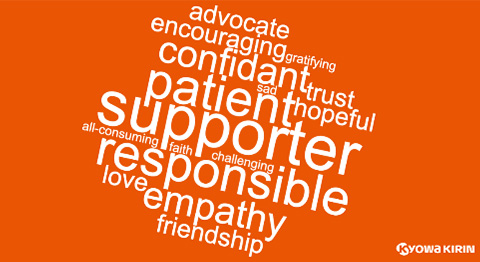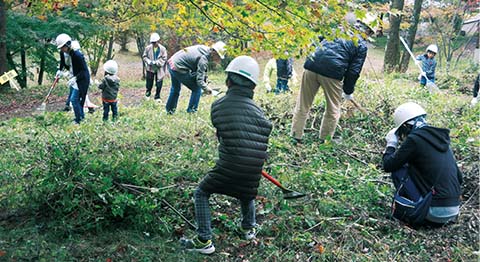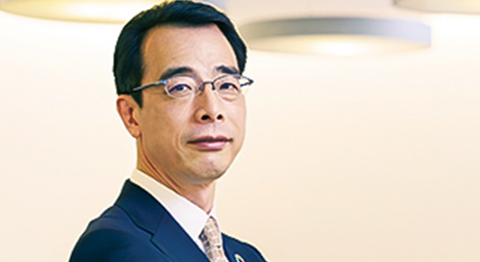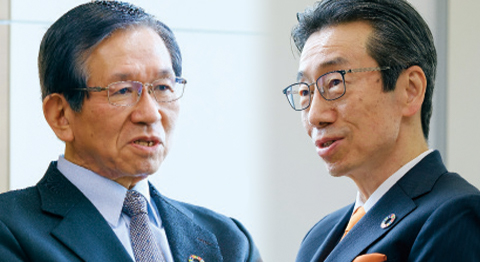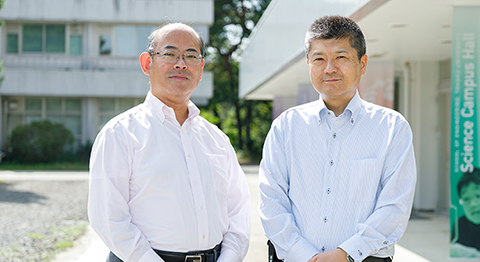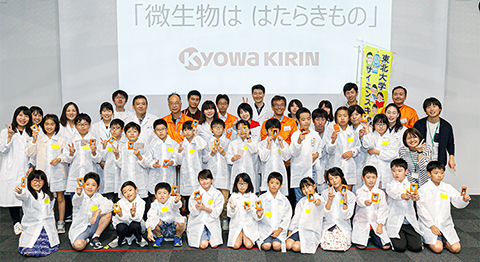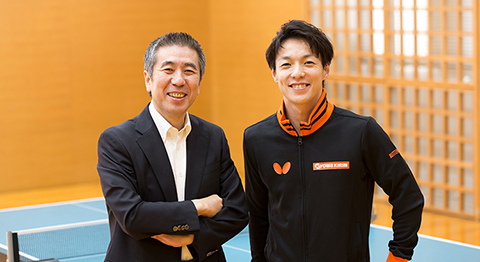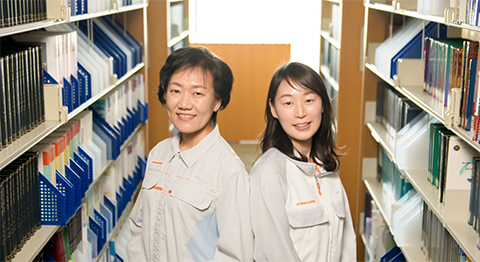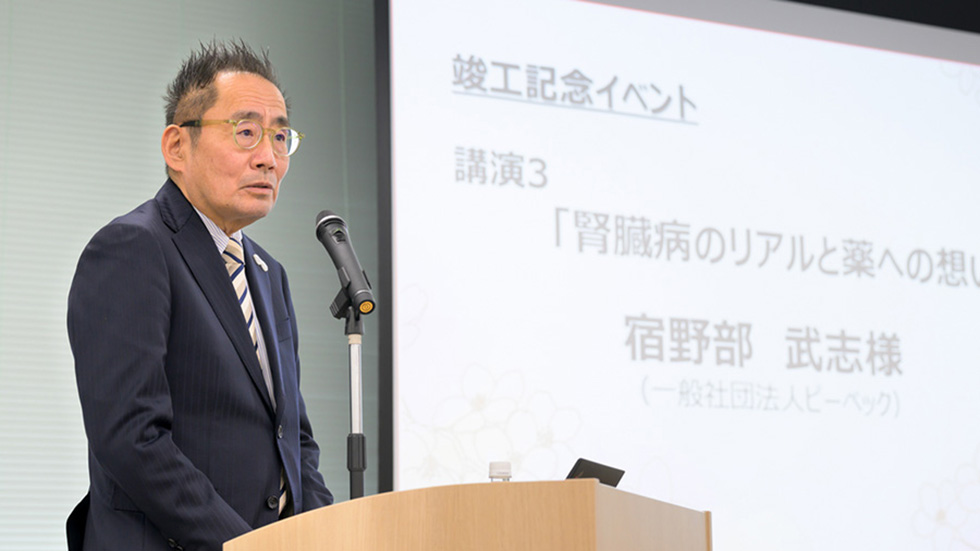
Index
Pharmaceutical companies and patients are inherently connected.
Valuing connections with patients: Strengthening efforts to ensure a stable pharmaceutical supply.
A commemorative presentation was held following the HB7 building completion ceremony and its facility tour. This is the second part of a report that covers a speech by Mr. Takeshi Shukunobe, who shared his insights from a patient’s perspective, as well as the dialogue that followed.
Speaker Profile
Mr. Takeshi Shukunobe
Born in 1968, he was diagnosed with chronic nephritis at age three and began dialysis at 18 due to chronic kidney failure. He later had his left kidney removed due to kidney cancer. After retiring from Sony Corporation in 2006, he founded Patienthood in 2010, followed by a general incorporated association, PPeCC, Inc.("PPeCC”), in 2019, where he now serves as CEO. He is also a certified social worker.
Pharmaceutical companies and patients are inherently connected.
Mr. Takeshi Shukunobe, now CEO of the general incorporated association PPeCC, shared his perspective in a speech titled “The Reality of Kidney Disease and Thoughts on Medicine.”
Diagnosed with kidney disease at the age of three, Shukunobe-san has been receiving dialysis since he was 18.
After graduating from university, he joined Sony Corporation, where he worked in the Human Resources Department and supported employees taking medical or caregiving leave. While balancing his full-time job with dialysis three times a week, he developed a strong desire to provide support that only someone with firsthand experience of illness could offer. Shukunobe-san became a certified social worker to pursue a different career. He then worked at the Japan National Council of Social Welfare and eventually established PPeCC.
PPeCC’s vision is to create a world where we can still do something. Shukunobe-san elaborated on this vision:
“I believe many people feel overwhelming fear when diagnosed with an illness and assume they must give up many things. But in reality, you don’t have to give up everything. With support from medicine, treatment options, and the legal system, there are still ways to cope and move forward. I set this vision to help build a world where we can still do something.”
Through his activities, Shukunobe-san aims to create a positive cycle in which patients’ voices are communicated to those in the medical field, leading to the development of medicine and support systems that reflect those voices. PPeCC serves as a hub that connects patient groups and individuals with illnesses to life science companies and medical professionals.
Shukunobe-san went on to share details of his daily life with dialysis, which he undergoes three times a week for five hours per session. He usually uses a private room during treatment, which allows him to attend online meetings or watch videos. He also spoke about the challenges of managing fluid and dietary restrictions, maintaining weight control, and balancing work with treatment.
“Some people take dialysis too seriously, as if it’s the end of their lives. But I was working in a human resources department and even went on overseas business trips while receiving dialysis. This year, I’ll be attending a patient conference in Kuala Lumpur and am making arrangements to undergo dialysis there. Many people assume they can no longer travel once they start treatment, but it is my goal to change that misconception.”
Shukunobe-san looked back at his life, saying, “There hasn’t been a single day when I didn’t take some form of medication.”
“Since I spend so much time on dialysis, it’s important to use the rest of my time efficiently. If side effects interfere with the time I’m not on dialysis, it reduces the time I can truly be myself. That’s where medications that reduce side effects become a lifesaver for me.”
He went on to talk about a medication that changed his life. Having suffered from a symptom, he was greatly helped by a new drug developed at the time. Expressing his gratitude, he said, “I don’t think I could’ve lived the life I have now if it weren’t for the medication.”
According to Shukunobe-san, many patients have expressed a desire to thank pharmaceutical companies personally. To help make that possible, he creates opportunities for patients and pharmaceutical companies’ staff to meet and talk. Drawing from his own experiences, he concluded his speech with a powerful message of encouragement:
“I know there are few opportunities for patients and pharmaceutical companies’staff to meet face-to-face. But there’s no doubt that we share a deep connection.”
Valuing connections with patients: Strengthening efforts to ensure a stable pharmaceutical supply.
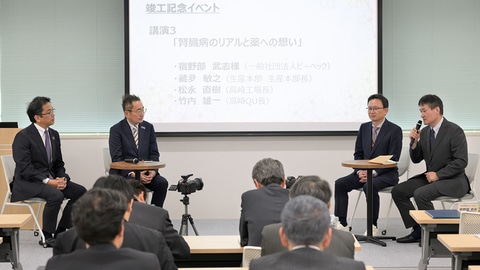
Next, the following three staff members joined Shukunobe-san for a discussion.
- Toshiyuki Kurata, Chief Supply Chain Officer
- Naoki Matsunaga, Takasaki Plant Manager, Manufacturing Division
- Yuichi Takeuchi, Head of Takasaki Quality Unit, Quality Division
Kurata reflected on the HB7 building tour held that morning, saying, “I was glad to hear that Shukunobe-san found us reliable. As I took part in the tour myself, I also felt that the staff at the Takasaki Plant are very dependable, which renewed my commitment to successfully launching the projects at this facility.”
Shukunobe-san shared that some patients feel concerned by news reports about pharmaceutical supply issues, even if they are currently able to obtain their medications without difficulty. He stated, “A stable supply is made possible by the efforts of many individuals. I want to create more opportunities for patients to see that firsthand.”
Following Shukunobe-san’s remarks, Takasaki Plant Manager Matsunaga mentioned the importance of the 4M framework in manufacturing: Man, Material, Method, and Machine. He explained that stable manufacturing can be achieved by critically analyzing these four elements. Recalling how visitors at the tour observed the plant’s human resource development, Matsunaga continued:
“Listening to Shukunobe-san made me realize another essential aspect of human resource development beyond technical skills: the mindset—another “M”—that our mission is to ensure a stable supply. I hope to provide training that strengthens both.”
Takeuchi, who is in charge of quality assurance, reflected on the phrase used by Shukunobe-san’s association, “a world where we can still do something ,” saying it left a strong impression on him.
“When we ensure a stable supply of medication, there are patients who are able to get through their day with peace of mind. It reminded me that, as workers at a pharmaceutical plant, we must continuously deliver high quality products.”
Takeuchi also emphasized the growing importance of data integrity (ensuring that all data is complete, with no missing or inconsistent information) in pharmaceutical GMP and introduced an initiative at the Takasaki Plant that uses AI to ensure trustworthy pharmaceutical production. Additionally, he highlighted the importance of creating a positive working environment to help employees produce quality products that make patients smile. He then shared a project to cultivate a quality culture that encourages open communication among staff.
Shukunobe-san left us with a final, heartfelt message: “A stable supply is made possible thanks to the efforts of every individual at this plant. I’m truly grateful.”
In conclusion, Kurata shared his vision for the future: “I hope to gradually increase opportunities for patients to see our production sites. I also want to continuously build relationships with patients so we can better understand each other’s perspectives.”
The commemorative presentation at the new HB7 building offered a chance to reflect on the importance of our work from diverse perspectives. It started with an overview of pharmaceutical production in Japan and ended with the vital connection between patients and pharmaceutical companies. Together with various stakeholders, Kyowa Kirin will continue our efforts to deliver life-changing value that makes smiles to those living with illness.
The activities mentioned in the article were conducted in Japan under the relevant laws and regulations of Japan.

